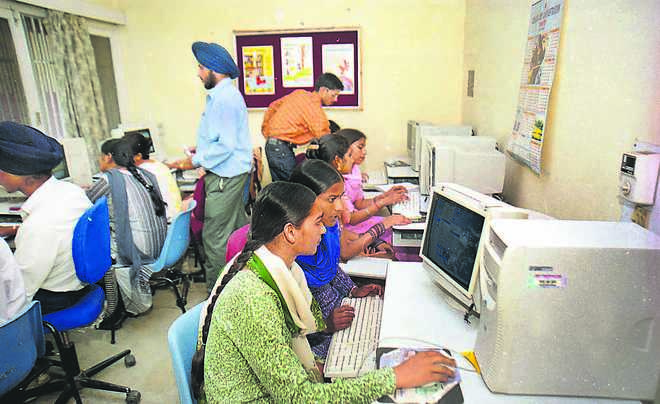
The past four decades have seen unprecedented innovations. However, poverty is still widespread. Tribune photo
Girish Sahni
Cooperative tools and exponential technologies are reshaping our globe. India no longer has to sit on the sidelines and wait for the future to unfold. We are now empowered to do our bit in changing the world. With a vision to develop affordable and accessible innovation for inclusive development, the Council of Scientific and Industrial Research (CSIR) has now sharpened its focus on the 800 million Indians living at the base of the economic pyramid.
After a review of the CSIR undertaken by the Prime Minister stressed that science and technology should be used for even greater public value, specifically for the benefit of the poor, the CSIR reached out to the people to know their pain-points. A nationwide survey was launched to gain first-hand knowledge about a household’s deprivations and visualise a customised plan to prioritise their problems and overcome these with the help of existing resources in the community and technological inputs.
While one family may have income disparity, problems relating to health, sanitation and transportation, the next-door neighbours may have different deprivations — this despite the fact that they live in the same slum cluster. The key is to allow each family to take ownership of their situation and make a family plan. What are my priorities? What am I going to do to rectify this? Who in the community has the resources to help me? What is my time-frame? This plan is the family’s responsibility.
Technology has long been recognised as playing an important role in human development. The past four decades have seen unprecedented innovations. Yet, despite the best efforts by many people, poverty is still widespread and many poor people do not have access to the technology that could help them. The visualised plan that how a family in a poor slum or a rural village can have the capacity to take stock of its own situation, can be empowering and it is quite innovative to offer technology to support them in their endeavours.
The CSIR, over the past seven decades, has promoted the use and adoption of intermediate technologies, which have been vastly superior to the primitive technology of bygone ages, but, at the same time, much simpler, cheaper and freer than the super-technology of the rich to reduce poverty among the Indian people. The revelation, which we have now encountered, is that technology should be compatible with the laws of ecology — gentle in its use of scarce resources, and designed to serve human beings. This way we can not only serve the 800 million of Indian poor but also the three billion global poor.
New science-led technologies present some specific challenges, including the perceptions of high cost, high risk, high complexity and the lack of knowledge about what is available. Yet, new technologies also present an enormous number of opportunities. By moving away from the entrenched systems of patents, production and markets that older technologies are locked into, these can do things differently and more appropriately. A major challenge is to unleash the public value of science and technology and channelise it to help reduce poverty. The market should not solely reap the benefits that are generated by the use of science and technology.
Technology is far from neutral in relation to both development and power. This became apparent long before the introduction of the current range of new technologies such as information and communications technology, biotechnology and nanotechnology. While the West gets used to the increasing pace of innovation, maximum change is taking place by the transfer of techniques from place to place. Technological systems — the way things are used, abused and controlled — may often be subject to political influence, but there are ways in which we can talk about better or worse new technologies.
Taking the idea that they should serve human beings as a fundamental axiom of appropriate technologies, is a useful starting point for asking how they can contribute to solving some of the intractable problems of poverty. Efforts to solve the widespread contamination of drinking water by arsenic, making leather processing more eco-friendly and developing point-of-care diagnostic systems have emerged as the points of suffering for which solutions are being sought.
CSIR laboratories have, in the past, developed useful technologies such as making incense sticks from temple flowers, making plastic wood from rice husk waste, improving the quality of coir fibre for production and high-efficiency post-harvest drying and processing technology for chillies, ginger, big cardamom and turmeric. The new focus will be on delivering new technologies that meet local needs based on the understanding and solving of a real problem, rather than on developing a new widget. I believe in being technologically agnostic about solutions and see good solution coming from a number of scientific disciplines, including synthetic biotechnology. The CSIR scientific clusters have thus been reoriented to be open-minded.
The concept of appropriate technology may have been around for several decades, but it is still relevant when considering introduction of technologies into poor communities. The prospects and promise of many new technological developments — the mobile phone, the internet, nanotechnology and genetic modification to name a few — have often been exciting, but their ability to provide sustainable change to the poor has been limited. Choices that fulfil people’s needs must be made. This requires moving away from the old ways, which are supply-driven and focused on delivering products to the market at a price, maximising profits for the owners of the intellectual capital. The CSIR has taken the plunge.
— The writer is Director-General, CSIR



























